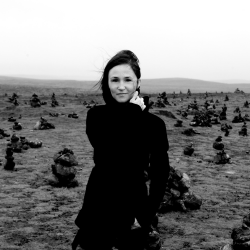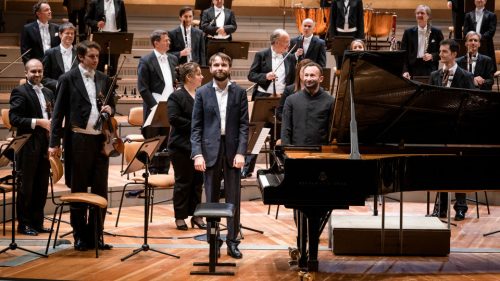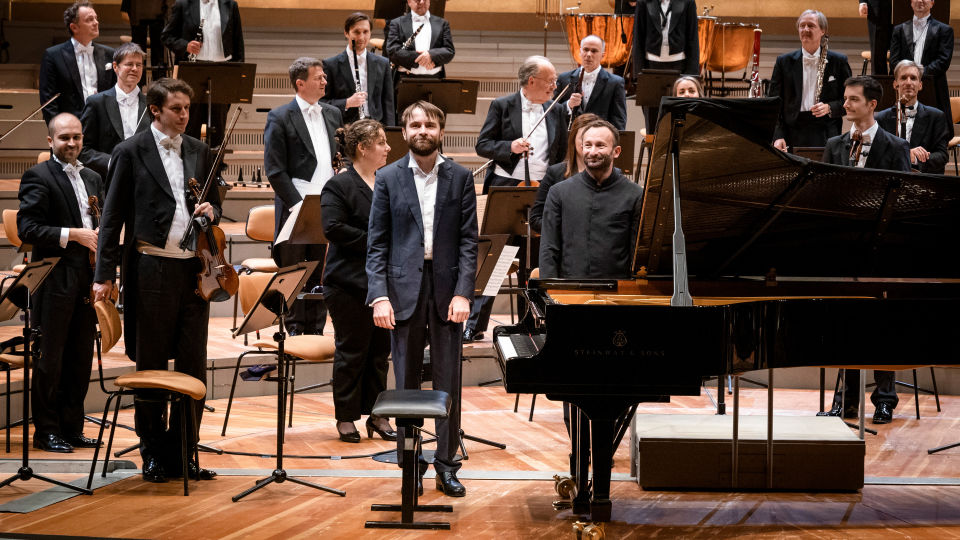 Germany Anna Thorvaldsdóttir, Prokofiev, Suk: Daniil Trifonov (pianist), Berlin Philharmonic Orchestra / Kirill Petrenko (conductor). Livestream in the Digital Concert Hall (click here) from the Philharmonie Berlin, 29.1.2021. (GT)
Germany Anna Thorvaldsdóttir, Prokofiev, Suk: Daniil Trifonov (pianist), Berlin Philharmonic Orchestra / Kirill Petrenko (conductor). Livestream in the Digital Concert Hall (click here) from the Philharmonie Berlin, 29.1.2021. (GT)

Anna Thorvaldsdóttir – CATAMORPHOSIS (world premiere)
Prokofiev – Piano Concerto No.1 in D flat major, Op.10
Suk – Pohádka léta (A Summer’s Tale) symphonic poem, Op.29
One of the central themes of this Berlin Philharmonic season is the programming of works by women composers. It is just about a year ago that the Iceland Symphony Orchestra visited the UK and brought with them music by their leading woman composer Anna Thorvaldsdóttir. At the time, I was enormously impressed by the atmospheric and highly skilled writing in her Aeriality. She has won significant acclaim for her growing catalogue of orchestral works, one of which has won her a Grammy Award. In her pre-concert interview, she spoke about the elements that inspire her to compose, about ‘musical structures, the flow of life, and the relationship between nature and structures.’ She is inspired by ‘the idea of the fragile relationship to our planet, and the balance between hope and urgency; these are two forces morphing between each other and this gives the energy for the piece. The fundamental textural emergence of sound which opens is airy and also percussive, like two tectonic plates clashing against each other. Thorvaldsdóttir was particularly grateful for Petrenko’s enormous energy in the rehearsals.
The beginning of CATAMORPHOSIS reminded me a little of the opening bars of Shostakovich’s Second Symphony with a quietly shimmering, rustling sound with unusual effects from the harps, piano, percussion with paper moving across the strings, and hands moving across the timpani. The contrabassoon uttered a mysteriously dark theme, creating an atmospheric idiom, this was followed by blasts of air from the wind sections, all of which subsided into nothingness; the imagery was emphasised by scraping bows on cymbals, brushes on timpani, and glissandos on the strings. The effect was created as if a great grey cloud was moving across the landscape with life forms moving slowly beneath. Suddenly, the strings produced an unearthly groan, which sounded strangely Wagnerian perhaps like the groans of Fafner in Siegfried. There were ascents and descents like a great beast breathing, and we were presented with dark scenes perhaps of primeval nature again with more strangely bizarre sound effects, perhaps it was the two great tectonic plates shifting? Then before the close of this eighteen-minute piece, there was a reprise of the opening bars. This is a fine orchestral work and will surely achieve many performances worldwide. The work was commissioned by the New York Philharmonic, the City of Birmingham Symphony Orchestra, and the BPO. One looks forward to hearing more from this highly talented composer from Iceland.

Last year, at Salzburg, the Berlin Philharmonic performed Beethoven piano concertos with Daniil Trifonov, and it seems as if Petrenko intends to regularly work with the brilliant pianist. The bright, brave opening bars of the Prokofiev First Piano Concerto transformed the atmosphere, the Russian pianist immediately displayed terrific technique producing dazzling keyboard skills and the beautiful second theme Poco puì mosso was suitably light and transparent yet was quickly offset by dissonance from the brass changing the imagery swiftly. In the quasi-slow movement Andante assai, there was some beautiful playing from the clarinet in the slightly jazzy syncopations, Trifonov’s playing here was tender yet naïve, while in the final section, Animato there was the sudden rush of the brass leading to a tremendous culmination. Interestingly Petrenko spoke highly of Trifonov placing him along with Vladimir Ashkenazy and Boris Berezovsky in a clear line of Russian pianism going back to Sviatoslav Richter with his emphasis on ‘very physical and technical’ performances.
I cannot recall ever hearing any music by Josef Suk in the concert hall, although I still have old, cherished Supraphon LPs of his orchestral music. His music is modernist, yet atonal, there are hints of Richard Strauss, and of Suk’s father-in-law Antonin Dvořák with the same richness of orchestral palate drawing from Czech folk song. Kirill Petrenko is an enthusiastic interpreter of Suk’s music and has already recorded this tone poem. In his pre-concert interview, he spoke of Suk’s music warmly in describing its late romanticism, and also said that of the many neglected orchestral works lying dormant by twentieth-century composers, Suk’s is the most unjustly neglected and he intends to perform more of Suk’s music for Berlin audiences. Petrenko considers ‘the five movements are part of a life experience, evoking a single day from first light to sundown. In some scenes, the imagery is of the sun disappearing behind the clouds, the birdsong of nature, of delirious dreams, and the allegory of the three blind men in which two are portrayed by a beautiful theme played on two cor anglais, while illusions emerge before night calms down.’ Petrenko thinks ‘it is an attempt by Suk to re-engage with life, and that only top orchestras can perform it well because of its unbelievably difficult technical writing.’
In the opening movement, Voices of Life and Consolation, the low strings intoned a rather sad idea, with the mood changing as the woodwind introduced a new brighter one, and the drama slowly built until the cor anglais of Dominik Wollenweber played a plaintive solo, picked up by the flute, clarinet, and oboe. The violins take up the theme, which transforms becoming playful and shared across the orchestra, developing into a rhapsodic colorful passage. With his lively movements and animated facial expression, it was evident how involved Petrenko was with the music, which slowly subsided into quietness.
In the second section, Midday, which opened with the bass clarinet of Manfred Preis, Emmanuel Pahud on flute, and the trumpet of Guillaume Jehl mellifluously evoking a sunlit forest glade with birdcalls as the cloud parts and the sun emerges. In the brief third movement, The Blind Musicians, two cor anglais opened with a plaintive idea, and were soon accompanied by two harps in a beautiful passage, and this became eloquently gorgeous when it was picked up by the solo viola of Naoko Shimuzu, accompanied by the violin of Daishin Kashimoto, with the idea joined by the strings before coming to a sudden end.
Opening the fourth movement, there was muted brass, dulcet tones from the strings In the Power of Phantoms, and there was a reflective idea from Preis on bass clarinet as there emerged a quirky playful idea in the orchestra, which gathered pace, yet was quickly interrupted by colourful woodwind writing. Petrenko masterfully managed the quickly changing themes and there was some quite magical playing for the whirling folkdance, soon another dance – a waltz – appeared with fantastic imagery then slowly dying away. In the final movement, Night, the strings played a heavenly idea with delightful solos again from Preis, and there emerged a dream-like passage on strings, accompanied by delightful solos from the cor anglais, viola, cello, violin, oboe before slowly dying away into silence once again.
Gregor Tassie
